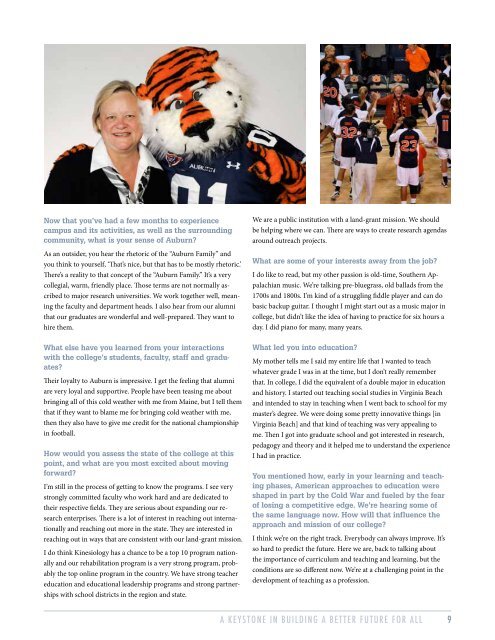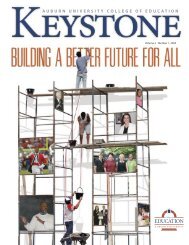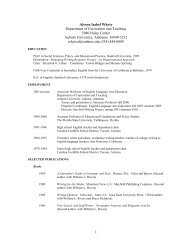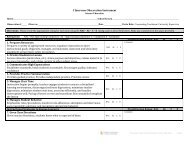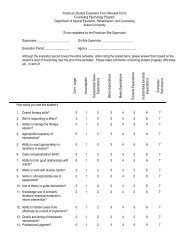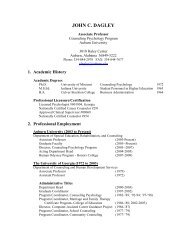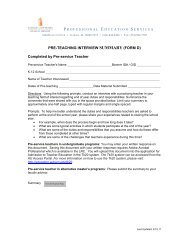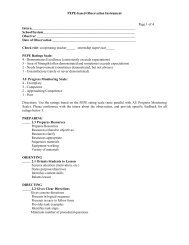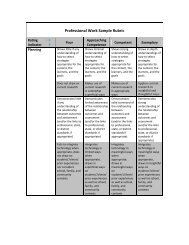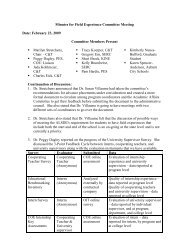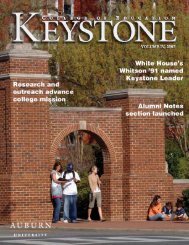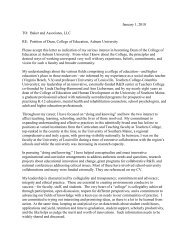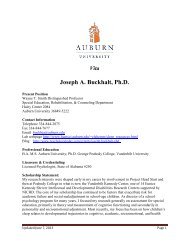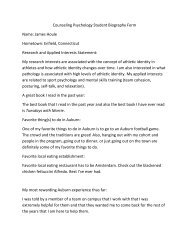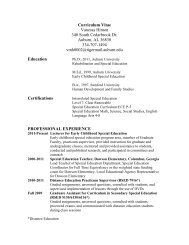8.1MB - College of Education - Auburn University
8.1MB - College of Education - Auburn University
8.1MB - College of Education - Auburn University
You also want an ePaper? Increase the reach of your titles
YUMPU automatically turns print PDFs into web optimized ePapers that Google loves.
Now that you’ve had a few months to experience<br />
campus and its activities, as well as the surrounding<br />
community, what is your sense <strong>of</strong> <strong>Auburn</strong>?<br />
As an outsider, you hear the rhetoric <strong>of</strong> the “<strong>Auburn</strong> Family’’ and<br />
you think to yourself, ‘That’s nice, but that has to be mostly rhetoric.’<br />
There’s a reality to that concept <strong>of</strong> the “<strong>Auburn</strong> Family.’’ It’s a very<br />
collegial, warm, friendly place. Those terms are not normally ascribed<br />
to major research universities. We work together well, meaning<br />
the faculty and department heads. I also hear from our alumni<br />
that our graduates are wonderful and well-prepared. They want to<br />
hire them.<br />
What else have you learned from your interactions<br />
with the college’s students, faculty, staff and graduates?<br />
Their loyalty to <strong>Auburn</strong> is impressive. I get the feeling that alumni<br />
are very loyal and supportive. People have been teasing me about<br />
bringing all <strong>of</strong> this cold weather with me from Maine, but I tell them<br />
that if they want to blame me for bringing cold weather with me,<br />
then they also have to give me credit for the national championship<br />
in football.<br />
How would you assess the state <strong>of</strong> the college at this<br />
point, and what are you most excited about moving<br />
forward?<br />
I’m still in the process <strong>of</strong> getting to know the programs. I see very<br />
strongly committed faculty who work hard and are dedicated to<br />
their respective fields. They are serious about expanding our research<br />
enterprises. There is a lot <strong>of</strong> interest in reaching out internationally<br />
and reaching out more in the state. They are interested in<br />
reaching out in ways that are consistent with our land-grant mission.<br />
I do think Kinesiology has a chance to be a top 10 program nationally<br />
and our rehabilitation program is a very strong program, probably<br />
the top online program in the country. We have strong teacher<br />
education and educational leadership programs and strong partnerships<br />
with school districts in the region and state.<br />
We are a public institution with a land-grant mission. We should<br />
be helping where we can. There are ways to create research agendas<br />
around outreach projects.<br />
What are some <strong>of</strong> your interests away from the job?<br />
I do like to read, but my other passion is old-time, Southern Appalachian<br />
music. We’re talking pre-bluegrass, old ballads from the<br />
1700s and 1800s. I’m kind <strong>of</strong> a struggling fiddle player and can do<br />
basic backup guitar. I thought I might start out as a music major in<br />
college, but didn’t like the idea <strong>of</strong> having to practice for six hours a<br />
day. I did piano for many, many years.<br />
What led you into education?<br />
My mother tells me I said my entire life that I wanted to teach<br />
whatever grade I was in at the time, but I don’t really remember<br />
that. In college, I did the equivalent <strong>of</strong> a double major in education<br />
and history. I started out teaching social studies in Virginia Beach<br />
and intended to stay in teaching when I went back to school for my<br />
master’s degree. We were doing some pretty innovative things [in<br />
Virginia Beach] and that kind <strong>of</strong> teaching was very appealing to<br />
me. Then I got into graduate school and got interested in research,<br />
pedagogy and theory and it helped me to understand the experience<br />
I had in practice.<br />
You mentioned how, early in your learning and teaching<br />
phases, American approaches to education were<br />
shaped in part by the Cold War and fueled by the fear<br />
<strong>of</strong> losing a competitive edge. We’re hearing some <strong>of</strong><br />
the same language now. How will that influence the<br />
approach and mission <strong>of</strong> our college?<br />
I think we’re on the right track. Everybody can always improve. It’s<br />
so hard to predict the future. Here we are, back to talking about<br />
the importance <strong>of</strong> curriculum and teaching and learning, but the<br />
conditions are so different now. We’re at a challenging point in the<br />
development <strong>of</strong> teaching as a pr<strong>of</strong>ession.<br />
A K e y s t o n e i n B u i l d i n g a B e t t e r F u t u r e f o r A l l 9


